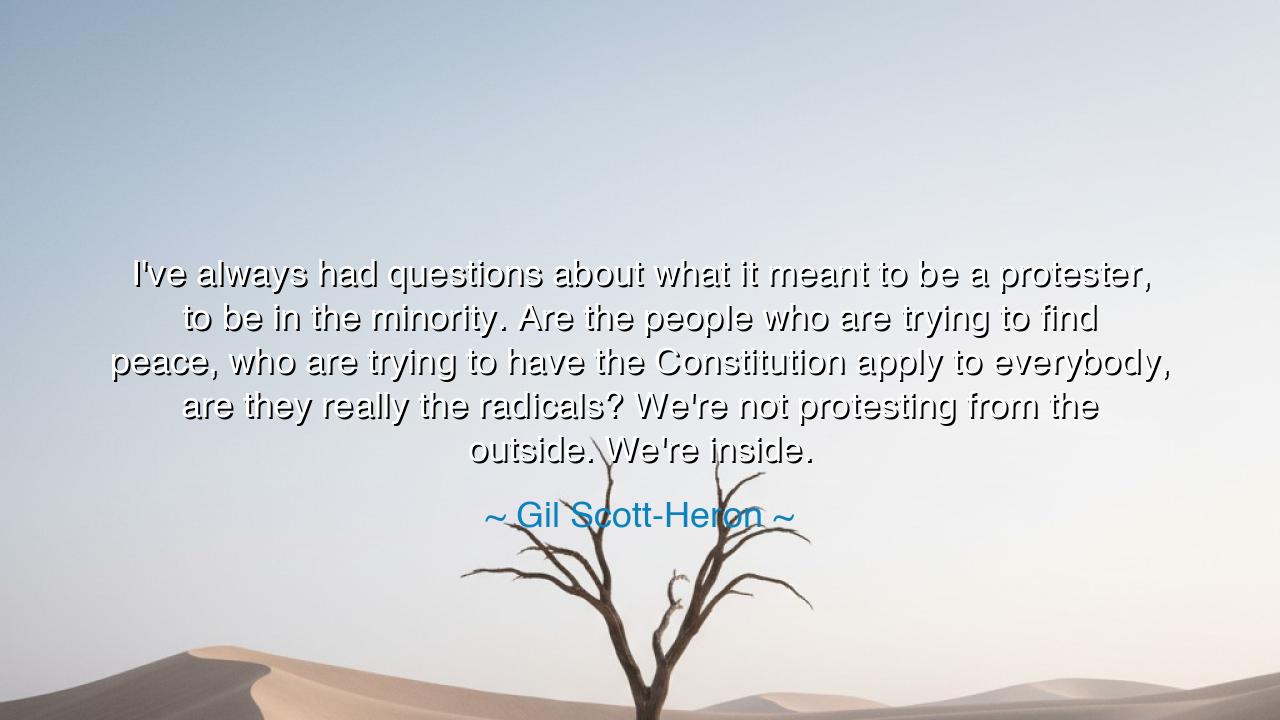
I've always had questions about what it meant to be a protester
I've always had questions about what it meant to be a protester, to be in the minority. Are the people who are trying to find peace, who are trying to have the Constitution apply to everybody, are they really the radicals? We're not protesting from the outside. We're inside.






Hear the words of Gil Scott-Heron, poet, prophet, and voice of the unheard: “I've always had questions about what it meant to be a protester, to be in the minority. Are the people who are trying to find peace, who are trying to have the Constitution apply to everybody, are they really the radicals? We're not protesting from the outside. We're inside.” In this declaration lies the cry of a generation that refused to accept the labels placed upon them. It is a challenge to the world’s definition of radicalism, and a reminder that those who cry out for justice are not outsiders tearing down the house, but rightful heirs demanding to dwell in it.
The heart of this saying lies in the question: who are the true radicals? Is it those who demand war, exclusion, and oppression? Or is it those who call for peace, equality, and the fulfillment of promises already written into law? Scott-Heron turns the accusation upside down. He reminds us that to protest for peace, for fairness, for the Constitution’s promise to be applied equally, is not rebellion—it is fidelity. Those who stand in the streets are not aliens to the nation; they are its conscience, calling it back to its own ideals.
The origin of these words is rooted in the turmoil of the 1960s and 1970s, when movements for civil rights, against war, and for equality erupted across America. Scott-Heron, through his music and poetry, gave voice to the frustration of Black Americans and the marginalized. To be labeled a “radical” was often a weapon used to silence, to brand reformers as dangerous. But he countered: the true danger lies not in those who demand justice, but in those who betray it. His words echo the wisdom of prophets who always stood accused, yet who bore the mantle of truth.
History gives us living proof. Consider the movement led by Martin Luther King Jr. and the civil rights marchers. They were called agitators, communists, radicals—yet all they asked was that the Constitution apply to everybody: that the right to vote, to live free of segregation, to enjoy equal protection under the law, belong to Black Americans as surely as to whites. They were not outsiders tearing down the republic; they were patriots holding the republic accountable to its founding vision. And though opposed by violence, their witness reshaped the nation.
Scott-Heron’s words remind us also that protest is not destruction. He insists: “We’re not protesting from the outside. We’re inside.” To protest is to belong, to care deeply enough to call for change. Those who shout from the margins do so not because they wish to abandon the house, but because they long to repair it. This truth is ancient: when Jeremiah wept over Jerusalem, when Gandhi marched for freedom, when suffragists demanded the vote—none stood outside humanity. They stood within, laboring to make the whole more just, more whole, more faithful to its own ideals.
The lesson, then, is powerful: do not despise the protester. Do not call radical the one who demands that peace and justice prevail. Instead, look to see whose cause is aligned with love, fairness, and truth. For history shows that those once branded as radicals—abolitionists, suffragists, civil rights leaders—were in fact the builders of tomorrow. The real radicals are those who cling to violence, exclusion, and hatred, for they tear at the foundations of peace itself.
Practically, this calls us to a new vision. When you see protests, do not judge only by noise or disruption. Ask: what truth are they trying to uphold? Whose promises are they trying to claim? And in your own life, do not fear to speak out when justice is denied. Even if you are in the minority, remember Scott-Heron’s wisdom: you are not outside. You are inside, a rightful voice in the human family, calling for it to live up to its highest ideals.
So I say unto you, O children of tomorrow: remember Gil Scott-Heron’s words. To demand peace is not radical. To demand equality is not rebellion. To hold a nation to its word is not treachery. These are acts of fidelity, of courage, of love. Walk boldly in this truth. For when the minority lifts its voice for justice, it speaks with the authority of eternity, and one day, the world will recognize that those once called radicals were in fact the guardians of peace.






AAdministratorAdministrator
Welcome, honored guests. Please leave a comment, we will respond soon